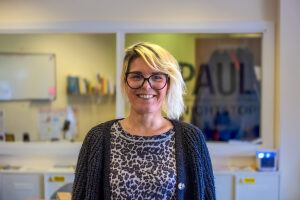
Nightstop coordinator, Lily Froidevaux, will ‘fight like hell’ to get young people the support they deserve.
Lily didn’t start in social care. She came from the world of fine dining—managing top restaurants in Paris and selling high-end wines to elite clients. But behind the polished hospitality career was a deeper calling she couldn’t ignore.
Lily grew up as a difficult teenager—angry, lost, constantly testing boundaries. “But my parents never gave up on me,” she says. That steady support became her foundation. As an adult, she faced her own struggles with mental health and saw how hard it was to access real, timely help. That experience didn’t break her—it gave her purpose.
Driven by a need to understand herself and others, she left hospitality and retrained in psychology: “I know what it’s like to feel lost. Supporting others helps me heal, too. It’s my way of paying it forward.”
Today, Lily is a Nightstop Coordinator with Depaul UK in the North East—working to secure emergency housing for young people facing homelessness. “I fight like hell to get these young people the support they deserve,” she says. And she does—every single day.
Nightstop offers emergency housing by placing young people with trained volunteer hosts. But this lifeline depends on quick decisions, relentless advocacy, and someone willing to step in when no one else will. That’s Lily.
Young people come to her in moments of chaos—fleeing violence, abandoned, traumatised. And she meets them with urgency, empathy, and resolve. “Every call, every placement, every push against a broken system—it matters.”
Her days are a blur of referrals, crisis calls, risk assessments, and nonstop coordination. What sets her apart isn’t the workload—it’s her refusal to let things slide.
“If Lily decides something needs to happen, it happens,” says a colleague. “She doesn’t let go.”
One of those calls was for Jo, a young LGBTQ+ woman thrown out of her home after a violent encounter with her mother. Jo had nowhere to go. Lily matched her with a same-sex couple—hosts who offered not just a roof, but affirmation. “I finally felt safe. I could be myself,” Jo said.
Lily didn’t stop there. She secured long-term housing, connected Jo to educational opportunities, and ensured she was supported at every step. Jo is now rebuilding, not just surviving.
To Lily, this isn’t aid—it’s equity.
“No one deserves to be on the street. Not a refugee, not a young person, not anyone.”
She doesn’t just place people in homes—she pushes systems to do better. “Sometimes that means challenging councils who say, ‘This person isn’t a priority.’ I’ll make their case until we know we’ve done everything for them.”
She’s managed safeguarding crises, navigated mental health emergencies, and fought tooth-and-nail to prevent someone from becoming a statistic. “Nightstop isn’t just a job for me,” she says. “These young people remind me of who I used to be—and who I could have become without someone in my corner. So I choose to be that person for them.”